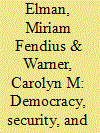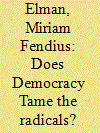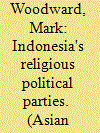|
|
|
Sort Order |
|
|
|
Items / Page
|
|
|
|
|
|
|
| Srl | Item |
| 1 |
ID:
081028


|
|
|
|
|
| Publication |
2008.
|
| Summary/Abstract |
This article analyzes the effects of democracy on religious political parties. Using a comparative and cross-regional approach, we argue that religious political parties in democracies can be "tamed" with access to patronage, power, and policy. While democracy tends to have a moderating influence, we identify the conditions and circumstances under which extremism may not be quelled merely by the party's participation in the government. The article briefly considers the arguments - both pro and con - that have emerged in recent debates over the intersection of religion, security, and democracy. The article then provides a framework for assessing the impact of democracy on religious political parties, and considers how these dynamics play out in the Asian region. In addressing the question "does democracy tame the radicals?" it is important to study Asia because it offers a set of varied democratic institutions; demonstrates different ways of adjudicating religion, the state, and secularism; and includes a diverse set of religious political parties espousing both moderate and radical political platforms. The article concludes with an overview of the Forum essays, which analyze democracy, security, and religious political parties in India, Indonesia, Italy and Israel.
|
|
|
|
|
|
|
|
|
|
|
|
|
|
|
|
| 2 |
ID:
081050


|
|
|
|
|
| Publication |
2008.
|
| Summary/Abstract |
This article considers how participation in the democratic political process influences the platforms and strategies of Israel's Jewish religious political parties. Focusing on the religious political parties that contested the March 2006 election in Israel, the article suggests that party ideology strongly influences the extent to which Israel's religious political parties have taken up moderate positions regarding Israel's internal and external security policies, especially with regard to religion and state issues; the Israeli-Palestinian conflict; and Israel's withdrawal from the post-1967 occupied territories. Ideology, however, is not determinative - regular participation in the electoral process and access to government resources has over time also worked to moderate initially hardline party positions. The fact that religious political parties typically serve as pivotal parties in Israel's governing coalitions accounts for why these parties, and their constituents, have largely avoided extremism. As a result of the integration of religious political parties into Israel's proportional representation, multi-party system, extremist violence in Israel has tended to be extra-parliamentary
|
|
|
|
|
|
|
|
|
|
|
|
|
|
|
|
| 3 |
ID:
081030


|
|
|
|
|
| Publication |
2008.
|
| Summary/Abstract |
The Indonesian democratic transition of the late 1990s led to the formation of numerous political parties many of which are religious. Only the Islamic parties are politically significant. It is possible to distinguish two basic types of religious parties. Some are based on explicitly religious principles; others are nominally secular but are led by religious figures or appeal to particular religious communities. While Indonesia is predominantly Muslim, Islamic parties have had only limited appeal. The openness of the political system and the ability of minor parties to enter coalitions has provided their leaders access to office and patronage. Even the Islamist Justice and Prosperity Party that resembles the Egyptian Muslim Brotherhood has chosen political participation instead of confrontation
|
|
|
|
|
|
|
|
|
|
|
|
|
|
|
|
| 4 |
ID:
081031


|
|
|
|
|
| Publication |
2008.
|
| Summary/Abstract |
The Christian democratic parties in Italy from the end of World War II to 2006 show that while the popularity of religious political parties may diminish due to fewer religious voters, if political institutions facilitate the participation of small parties in government then religious parties can survive, albeit in reduced size. Their political influence may be greater than suggested by their size if they can be a deciding element in a governing coalition's survival. With access to the spoils of office, religious parties are able to distance themselves from the demands of seemingly powerful organized religious interests. Having to compromise with other parties in the government on policy in order to remain in government can also compel a religious party to moderate its platform and even soft-pedal core religious issues. The Christian democratic parties of Italy have, due to ideology and to strategic assessments of security interests, supported Western regional and international security cooperation
|
|
|
|
|
|
|
|
|
|
|
|
|
|
|
|
| 5 |
ID:
081029


|
|
|
|
|
| Publication |
2008.
|
| Summary/Abstract |
This paper systematically analyzes the origins and emergence of the Hindu nationalist Bharatiya Janata Party (BJP) in Indian politics, and its impact on secularism, domestic politics, and foreign policy. We contend that it was the institutional context of Indian politics in the 1980s, and not Hindu nationalist political ideology per se, that facilitated the emergence of the BJP. India's democratic institutions, particularly coalition politics, have moderated the BJP's radical policy goals. As such, the BJP does not pose a threat to the functioning of the Indian democracy. However, with its long-term goal to redefine Indian nationhood, and its dependence on the Rashtriya Swayamsevak Sangh (RSS) cadre for electoral success, the party's militant and violent agenda against minorities, especially Muslims, remains intact. The BJP's single major success has been the communalization of Indian politics by changing the discourse on secularism. In spite of its nationalist and aggressive rhetoric, there was no substantive change in India's foreign and security policies under the BJP-led National Democratic Alliance (1999-2004). More broadly, this paper demonstrates that religion and democracy have always been in a dialectic in the Indian context. After all, India's nominally secular Congress party has used religious symbolism for electoral gains. As such, the equilibrium between religion and democracy needs to be constantly negotiated in India
|
|
|
|
|
|
|
|
|
|
|
|
|
|
|
|
|
|
|
|
|